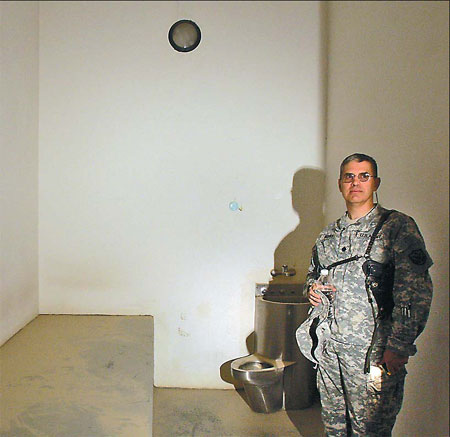US officer in Iraq on historic mission
Updated: 2011-11-19 07:54
By W.G. Dunlop (China Daily)
|
|||||||||
|
US Army Lieutenant Colonel Jerry Brooks, 48, the army's top historian in Iraq, stands in the cell of Ali Hassan al-Majid, known as "Chemical Ali" and the cousin of former Iraqi leader Saddam Hussein, on Nov 7 in Baghdad's Camp Victory military base. Ali AL-Saadi / Agence France-Presse |
BAGHDAD, Iraq - US Army Lieutenant Colonel Jerry Brooks is on his third tour in Iraq, but his mission has not been a typical one: As an army historian, he is charged with documenting the history of the Iraq war.
On his latest deployment, Brooks, 48, is the command historian for the United States in Iraq, making him the army's top historian in the country.
He is still working to document the history of the conflict with an emphasis on US involvement, even as US forces are leaving Iraq. The US withdrawal is to be completed by year's end.
There were once 16 army historians in Iraq, but that number is now down to two, Brooks said.
"My end product (will) be several quarterly histories that will be the basis of the histories that are written years from now - maybe not by my sons but their children," Brooks told AFP.
The quarterly histories have not been published yet, and will generally not be until they are declassified - a minimum of 10 years from now, he said.
He has also collected a huge amount of documents during his time in Iraq that "will be used to garner lessons learned for the military services as well as provide a single source of information regarding what was going on in Iraq during a particular time", he said.
For Brooks, there are three main strategic lessons to be drawn from the Iraq war: the need for contingency planning, having enough personnel and the importance of getting your message out.
"You have to plan, plan and continue to plan. You have to be ready to deal with any contingency that comes up," he said.
Second, "you have to make sure you have enough people to execute the mission and enough to have any unexpected issues".
And third, "information is a weapon. You have to get out in front of the enemy with your message".
Brooks, who was born in Pensacola, Florida, graduated from the Virginia Military Institute in 1985 with a bachelor's degree in history and was commissioned as a second lieutenant in 1986.
In 1988, he entered the army reserve and studied at James Madison University, graduating with a master's in history in 1990.
Brooks, it turns out, became an army historian somewhat by accident.
After graduate school, he worked in insurance, but remained in the army reserves.
In 1995, he was sent to Fort Monroe in Virginia for annual reserve training, during which a colonel asked the assembled soldiers if any had a background in history. Brooks responded that he did.
"In February of 1996, I received a letter telling me I was now designated an army historian," Brooks said.
"Five months later," he said, "I was in Bosnia working as a military historian."
"You could say that I stumbled into being a historian," Brooks said. "It was a very fortunate stumble for me."
"My focus as a historian has been on the US efforts here in Iraq. During my first two tours here, the key areas were the operational level actions," said Brooks.
"I was also busy doing document collection and interviewing. My document collection has been over one terabyte all three times," he said, referring to a measure of computer storage capacity.
From a personal standpoint, the third deployment was more difficult than the others, said Brooks, who did not have children when he was deployed before. His wife gave birth to his second son in August, while he was in Iraq.
"I get to meet my son for the first time next month," he said.
Until then, Brooks will keep working on documenting events. "I will continue to gather information and documents up until the day I leave," he said.
Agence France-Presse












